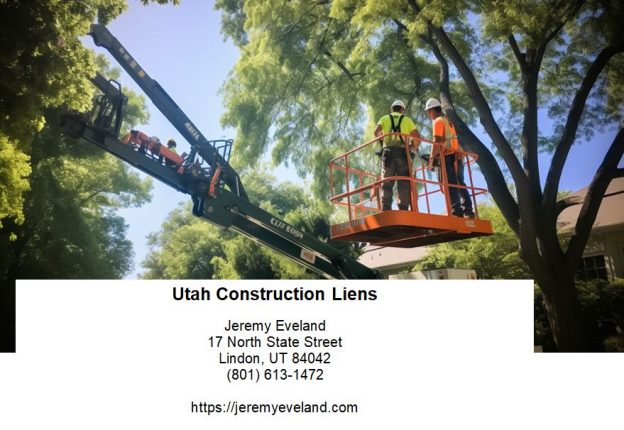This post is about Utah Construction Liens.
The construction lien process in Utah is structured with specific time limits at each stage:
- Filing the Preliminary Notice: Within 20 days of starting work, contractors or suppliers must file a preliminary notice with the Utah State Construction Registry. This includes details of the work and contact information.
- Recording a Notice of Construction Lien: If a contractor or supplier hasn’t been paid, they must record a construction lien. The timeline for this varies depending on the role of the claimant. Generally, a lien must be filed within 90 days after the completion of the project or the last day the claimant provided labor or materials.
- Enforcing the Lien: The claimant has a limited time frame, typically within 180 days of recording the lien, to enforce it through legal action if payment is still outstanding.
- Releasing the Lien: Once payment is received, the claimant is required to release the lien. This should be done promptly to avoid legal penalties.
These time limits are critical for maintaining lien rights and ensure a balanced approach between protecting the rights of those who contribute labor or materials and the rights of property owners.
Here is a more in-depth analysis:
To provide a comprehensive and detailed overview of the construction lien process in Utah, it’s important to understand each step and the corresponding legal requirements as outlined in the Utah State Code. Acting as a lawyer, I’ll guide you through this process:
- Filing the Preliminary Notice (Utah Code § 38-1a-501):
- Requirement: Any person (including contractors and suppliers) who wishes to retain the right to file a construction lien must file a preliminary notice.
- Time Frame: This notice must be filed within 20 days after commencing work or providing materials/services.
- Content: The notice should include contact information and a description of the work or materials provided.
- Purpose: This step ensures the property owner is aware of the potential lien and the parties involved in the project.
- Recording a Notice of Construction Lien (Utah Code § 38-1a-502 to Utah Code 38-1a-507):
- Requirement: If unpaid for work or materials, the claimant must record a construction lien with the county recorder where the property is located.
- Time Frame for General Contractors: A lien must be filed within 90 days after the entire project is completed.
- Time Frame for Subcontractors and Suppliers: They must file a lien within 90 days after the last day they provided labor or materials.
- Content: The lien should include a description of the labor/materials provided, the amount due, and the property description.
- Enforcing the Lien (Utah Code § 38-1a-601 to 38-1a-609):
- Requirement: To enforce the lien, legal action must be initiated.
- Time Frame: The claimant has 180 days from the date of recording the lien to initiate foreclosure proceedings.
- Process: The enforcement process involves filing a lawsuit and potentially culminates in the sale of the property to satisfy the lien.
- Releasing the Lien (Utah Code § 38-1a-801):
- Requirement: Once the debt is paid, the claimant must file a lien release.
- Time Frame: This should be done promptly after receiving payment to clear the title of the property.
- Notices of Completion and Extension of Time Limits (Utah Code § 38-1a-508):
- Notice of Completion: Property owners can file a notice of completion which may shorten the time frame for contractors to file a lien.
- Extension of Time Limits: In certain situations, the time limits for filing a lien may be extended, particularly if there is a written acknowledgment of the debt by the property owner.
- Legal Implications and Compliance:
- Importance of Compliance: Adhering to these time frames and requirements is crucial. Non-compliance can result in the loss of lien rights.
- Advisory: It’s advisable for parties involved in construction projects in Utah to consult with legal counsel to ensure compliance with these statutes.
Understanding and complying with these detailed legal requirements is essential for any party involved in a construction project in Utah, whether they are a contractor, subcontractor, supplier, or property owner. The construction lien process is designed to protect the rights of those who contribute to the improvement of property, while also providing mechanisms for property owners to be aware of and address any potential liens against their property.
When you need a construction lien lawyer in Utah, call attorney Jeremy Eveland (801) 613-1472.
Areas We Serve
We serve individuals and businesses in the following locations:
Salt Lake City Utah
West Valley City Utah
Provo Utah
West Jordan Utah
Orem Utah
Sandy Utah
Ogden Utah
St. George Utah
Layton Utah
South Jordan Utah
Lehi Utah
Millcreek Utah
Taylorsville Utah
Logan Utah
Murray Utah
Draper Utah
Bountiful Utah
Riverton Utah
Herriman Utah
Spanish Fork Utah
Roy Utah
Pleasant Grove Utah
Kearns Utah
Tooele Utah
Cottonwood Heights Utah
Midvale Utah
Springville Utah
Eagle Mountain Utah
Cedar City Utah
Kaysville Utah
Clearfield Utah
Holladay Utah
American Fork Utah
Syracuse Utah
Saratoga Springs Utah
Magna Utah
Washington Utah
South Salt Lake Utah
Farmington Utah
Clinton Utah
North Salt Lake Utah
Payson Utah
North Ogden Utah
Brigham City Utah
Highland Utah
Centerville Utah
Hurricane Utah
South Ogden Utah
Heber Utah
West Haven Utah
Bluffdale Utah
Santaquin Utah
Smithfield Utah
Woods Cross Utah
Grantsville Utah
Lindon Utah
North Logan Utah
West Point Utah
Vernal Utah
Alpine Utah
Cedar Hills Utah
Pleasant View Utah
Mapleton Utah
Stansbury Par Utah
Washington Terrace Utah
Riverdale Utah
Hooper Utah
Tremonton Utah
Ivins Utah
Park City Utah
Price Utah
Hyrum Utah
Summit Park Utah
Salem Utah
Richfield Utah
Santa Clara Utah
Providence Utah
South Weber Utah
Vineyard Utah
Ephraim Utah
Roosevelt Utah
Farr West Utah
Plain City Utah
Nibley Utah
Enoch Utah
Harrisville Utah
Snyderville Utah
Fruit Heights Utah
Nephi Utah
White City Utah
West Bountiful Utah
Sunset Utah
Moab Utah
Midway Utah
Perry Utah
Kanab Utah
Hyde Park Utah
Silver Summit Utah
La Verkin Utah
Morgan Utah
Lien Attorney Consultation
When you need help from an Estate Lawyer in Utah, call Jeremy D. Eveland, MBA, JD (801) 613-1472 for a consultation.
Jeremy Eveland
17 North State Street
Lindon UT 84042
(801) 613-1472
Related Posts
Business Lawyer Saratoga Springs Utah
The Role of Business Law in Protecting Minority Shareholder Rights
What Are The 4 Different Types of Business Law?
Business Lawyer Washington Utah
Business Lawyer South Salt Lake Utah
Legal Requirements for Utah Technology Startups
Business Lawyer Farmington Utah
Due Diligence For Buying A Utah Business
Understanding Utah’s Labor Laws
Business Lawyer North Salt Lake Utah
Product Liability Laws in Utah
Preventing Cybersecurity Breaches
Business Lawyer North Ogden Utah
Business Lawyer Brigham City Utah
Mastering Business Law: Key Essentials For Success
Business Lawyer Centerville Utah
Shareholder Agreements in Utah
Business Lawyer Hurricane Utah
Corporate Attorney West Jordan UT
Estate Planning For Survivorship Considerations
Construction Lawyer West Bountiful Utah
Construction Lawyer Snyderville Utah
Utah Construction Liens
byu/Ok_Injury5184 infreelegalconsultation


